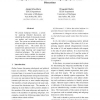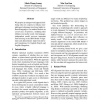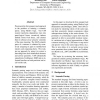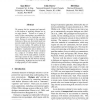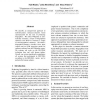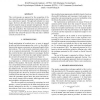119
click to vote
ACL
2012
13 years 4 months ago
2012
This paper presents an unsupervised approach to learning translation span alignments from parallel data that improves syntactic rule extraction by deleting spurious word alignment...
ACL
2012
13 years 4 months ago
2012
We present Subgroup Detector, a system for analyzing threaded discussions and identifying the attitude of discussants towards one another and towards the discussion topic. The sys...
COLING
2010
14 years 9 months ago
2010
We propose an unsupervised approach utilizing only raw corpora to enhance morphological alignment involving highly inflected languages. Our method focuses on closed-class morpheme...
130
click to vote
EMNLP
2009
14 years 12 months ago
2009
We present the first unsupervised approach to the problem of learning a semantic parser, using Markov logic. Our USP system transforms dependency trees into quasi-logical forms, r...
131
click to vote
NAACL
2010
14 years 12 months ago
2010
We propose the first unsupervised approach to the problem of modeling dialogue acts in an open domain. Trained on a corpus of noisy Twitter conversations, our method discovers dia...
118
click to vote
ACL
2008
15 years 3 months ago
2008
We describe an unsupervised approach to multi-document sentence-extraction based summarization for the task of producing biographies. We utilize Wikipedia to automatically constru...
112
click to vote
CIKM
2008
Springer
15 years 4 months ago
2008
Springer
Folksonomies provide a comfortable way to search and browse the blogosphere. As the tags in the blogosphere are sparse, ambiguous and too general, this paper proposes both a super...
ICMCS
2007
IEEE
15 years 8 months ago
2007
IEEE
This work presents an approach for the recognition of the roles played by speakers participating in radio broadcast news (e.g. anchorman or guest). The approach includes two main ...

